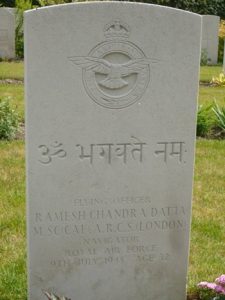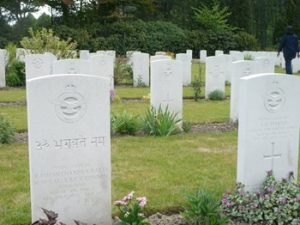The year is 1936. The Dutta family from Sylhet ( then undivided India, now part of Bangladesh ) were proud of their son, Ramesh. He had studied and graduated in Geology from Presidency College, Calcutta.

The shining light of the family was on his way to graduating from the prestigious Royal College of Science in London. Unfortunately, before he could graduate, Europe was in the midst of the Second World War. His return to India seemed impossible. He thought the only possible route to return to India was to enlist with the Royal Air Force of England. He joined as a navigator of the RAF. This was easy as he was a student of Geology and needed minimum training.
Soon, the war consumed him.
Some years later, around 1948 after independence, the Dutta family, now in Delhi, India received a trunk full of Ramesh’s possessions. It contained his ceremonial uniform, letters, photographs and a tobacco pipe. However, one of the photographs had a woman with a child on her lap.
Those were turbulent years. It was almost impossible to communicate. Nobody knew what had happened to Ramesh Dutta. Who was the lady with the child? Where were they? Ramesh Dutta became folklore in the family.
The year 2002
The search continued for seven decades until an inquisitive tech-savvy bride of the Dutta family, Joyee, saw the picture of Ramesh Dutta and heard about him from her mother-in-law (whose uncle was Ramesh Dutta) and began to uncover the mystery.
While the search was going on by Joyee, Ramesh’s son, Graham who is now in his 60s, living with his son Tom and wife Aileen had kept his visiting card at every memorial/place they felt Ramesh’s family in India would search.
Coincidentally when Joyee was searching through the websites, she spotted Ramesh Dutta’s picture in the cemetery at Heverlee in Belgium.
Joyee connected with the chief of the cemetery and left a message that anyone looking for Ramesh Dutta’s roots should contact her.
Few days later Joyee received a call from an woman called Ailleen. She introduced herself as Ramesh Dutta’s son , Graham’s wife. They now live in Birmingham, UK.
Aileen then revealed what had happened to Ramesh Dutta. Ramesh during bombing was badly injured and while in the hospital fell in love with a French nurse named Ivy. They had a son and Ramesh decided to come to India after the war and introduce them to his family in Delhi. But that didn’t happen. Ivy fell in love with a Frenchman and did not want to reveal that she had a son. So she kept her son in a church with a letter that she was leaving behind the son and Ramesh, his father would soon return from the war and they would go back to India. Until then she would send the church an amount every month to take care of the son. Ivy went to France and married her French boyfriend and never returned.
Ramesh Dutta, however, succumbed to a fearful German attack and died and was buried in the Heverlee cemetery; and no one was informed. The 32 year old, a navigator in 97 squadron died on July 9, 1943 when his Avro Lancaster was shot down by a German night fighter over Belgium at Bassenge during an operation against Koln1.


Once the war was over, a member of the Madders family adopted Ramesh Dutta’s son and named him Graham Madders. Graham continued to grow up in the Madders family. Madders family visited India in search of Ramesh’s roots. They visited Presidency College, Calcutta, and searched the RAF documents but failed to trace Ramesh Dutta’s family.
Meanwhile, Madders family visited the cemetery and created the top of the tombstone inscribed in perfect Devanagri script. And kept a card and registered their address for anyone looking for the details of Ramesh Dutta
70 years later, when Aileen and Joyee connected, Dutta family found their lost grand uncle and found a new cousin in Graham. Graham found his father’s roots and his new family in India.
Dutta family and Madders family are now part of one extended family. The blood somehow finds a vein to flow in.
- Chorley, W.R.(1992), Royal Air Force Bomber Command Losses of the Second World War: Aircraft and Crew Losses: 1943. p. 223 ↩︎
By profession, Ranabir Sen is a market researcher. Having traveled and lived in several countries in the Middle East and South-East Asia, he now lives in Gurgaon, India. He is also an author of the book, Finding Graham.
